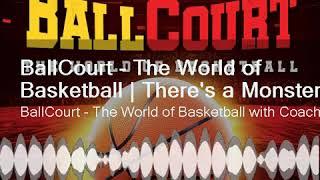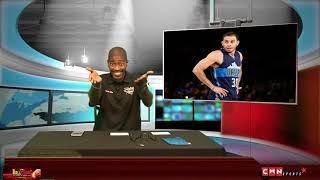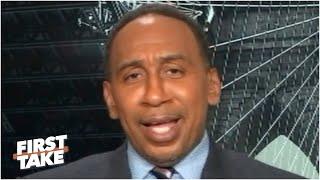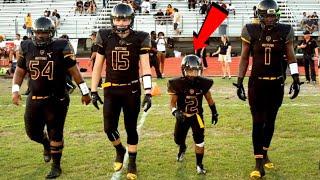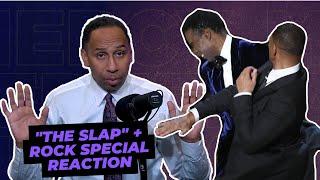It takes years and a series of trials to get to the NBA level of officiating. Zach Zarba is a 15-year NBA referee. Like many professional referees, he started by refereeing little kids and eventually moved up to the high school and college levels. Now he shares the court with the likes of LeBron James and Stephen Curry.
Business Insider tells you all you need to know about business, finance, tech, science, retail, and more.
Subscribe to our channel and visit us at: http://www.businessinsider.com/
BI on Facebook: https://www.facebook.com/businessinsider/
BI on Instagram: https://www.instagram.com/businessinsider/
BI on Twitter: https://twitter.com/businessinsider
--------------------------------------------------
Following is a transcript of the video:
It's always easy to blame the referee. But what's it like to be that Official?
Zach Zarba: My name is Zach Zarba and I'm a 15-year NBA referee. The pressure is underestimated — you know, it's taken for granted sometimes. It takes a lot to be able to function and exist in a pressure-filled environment and you have to be calm.
Zach has had his fair share of court time. He played D3 basketball for SUNY New Paltz.
Zarba: My father was a baseball, local baseball umpire in Brooklyn and he did high school and college and he kind of gave me the idea to try officiating.
How did Zach become one of the NBA's 65 referees? It's a long road to reach his level.
Zarba: You start from the bottom. You start from CYO 4, 5-year-olds, 6 year olds. You work your way up. You do high school basketball, you do a little bit of college. I did a lot of work in the New York City Pro Am leagues and and then the D-League.
If you're good enough, you go to training camp. If that goes well, you might be recruited to the G-League. Only those at the top of the G-League get accepted as NBA referees
Zarba: You have to be able to run up and down with the best athletes in the world. You have to stay light. The lighter you are, the less wear and tear on your legs, on your knees, on your feet. That's going to give you a longer career.
Clearly, staying in shape is key. How does Zach stay trim?
Zarba: So, for me personally, it's an hour cardio a day. It’s core work, it's you know, abs. It's a lot of weight work on the legs to protect the knees.
Referees have to keep more than just their bodies in shape.
Zarba: I do a lot of meditation during the day before the game and stuff like that just in order to find a calm place in order to have clarity because we're making decisions that likely affect people's careers, people's jobs. Someone wins, someone loses and you just want the utmost clarity and peace in a charged environment.
On game day, Zach and his fellow officials will meet around 11 a.m. to catch up. They'll head to the arena 90 minutes before tip-off to run through their pre-game routine.
Zarba: The interaction with players is an ongoing art. Some nights are easier than others, but communication is key. Communication and listening skills are huge. At the end of the day, we may agree to disagree on some subjects, but the respect comes both ways. We are not more lenient with the stars. I would say the star players actually are disadvantaged more than anyone else. You're going to concede that we make mistakes, which we do, the mistakes we make are going to be on the people who have the ball in their hand 75% of the time, which in this case is the star players. They hold the ball 75% of the time. They put pressure on the defense and pressure on the officials, and if and when mistakes are made, they're usually made with them.
On top of the stress of the game, refs are on the road a ton. Sometimes for up to 10 days at a time
Zarba: The travel is difficult. For the more veteran guys, it's 24, 25 nights gone from your family a month. It's basically 8 months on and then 4 months off because all that time gone during the winter, you have to reconnect with your family and so we're home during the summer.
Business Insider tells you all you need to know about business, finance, tech, science, retail, and more.
Subscribe to our channel and visit us at: http://www.businessinsider.com/
BI on Facebook: https://www.facebook.com/businessinsider/
BI on Instagram: https://www.instagram.com/businessinsider/
BI on Twitter: https://twitter.com/businessinsider
--------------------------------------------------
Following is a transcript of the video:
It's always easy to blame the referee. But what's it like to be that Official?
Zach Zarba: My name is Zach Zarba and I'm a 15-year NBA referee. The pressure is underestimated — you know, it's taken for granted sometimes. It takes a lot to be able to function and exist in a pressure-filled environment and you have to be calm.
Zach has had his fair share of court time. He played D3 basketball for SUNY New Paltz.
Zarba: My father was a baseball, local baseball umpire in Brooklyn and he did high school and college and he kind of gave me the idea to try officiating.
How did Zach become one of the NBA's 65 referees? It's a long road to reach his level.
Zarba: You start from the bottom. You start from CYO 4, 5-year-olds, 6 year olds. You work your way up. You do high school basketball, you do a little bit of college. I did a lot of work in the New York City Pro Am leagues and and then the D-League.
If you're good enough, you go to training camp. If that goes well, you might be recruited to the G-League. Only those at the top of the G-League get accepted as NBA referees
Zarba: You have to be able to run up and down with the best athletes in the world. You have to stay light. The lighter you are, the less wear and tear on your legs, on your knees, on your feet. That's going to give you a longer career.
Clearly, staying in shape is key. How does Zach stay trim?
Zarba: So, for me personally, it's an hour cardio a day. It’s core work, it's you know, abs. It's a lot of weight work on the legs to protect the knees.
Referees have to keep more than just their bodies in shape.
Zarba: I do a lot of meditation during the day before the game and stuff like that just in order to find a calm place in order to have clarity because we're making decisions that likely affect people's careers, people's jobs. Someone wins, someone loses and you just want the utmost clarity and peace in a charged environment.
On game day, Zach and his fellow officials will meet around 11 a.m. to catch up. They'll head to the arena 90 minutes before tip-off to run through their pre-game routine.
Zarba: The interaction with players is an ongoing art. Some nights are easier than others, but communication is key. Communication and listening skills are huge. At the end of the day, we may agree to disagree on some subjects, but the respect comes both ways. We are not more lenient with the stars. I would say the star players actually are disadvantaged more than anyone else. You're going to concede that we make mistakes, which we do, the mistakes we make are going to be on the people who have the ball in their hand 75% of the time, which in this case is the star players. They hold the ball 75% of the time. They put pressure on the defense and pressure on the officials, and if and when mistakes are made, they're usually made with them.
On top of the stress of the game, refs are on the road a ton. Sometimes for up to 10 days at a time
Zarba: The travel is difficult. For the more veteran guys, it's 24, 25 nights gone from your family a month. It's basically 8 months on and then 4 months off because all that time gone during the winter, you have to reconnect with your family and so we're home during the summer.
- Category
- NBA
Be the first to comment






